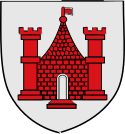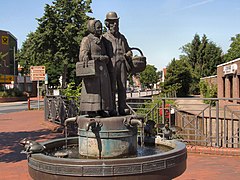List of personalities of the city of Quakenbrück
This list of the personalities of the city of Quakenbrück includes well-known sons and daughters of the city as well as personalities who have worked in the village. The main article about the city of Quakenbrück provides information about honorary citizenships .
sons and daughters of the town
- Hermann Bonnus (1504–1548), reformer
- Thomas Simon Jöllemann (* 1670), Baroque sculptor
- Cornelius Dietrich Koch (1676–1724), professor of logic and metaphysics in Helmstedt
- Heinrich Wilhelm Eckmann (1712–1777), organ builder
- Dietrich Hermann Hegewisch (1740–1812), historian
- Christian Matthias Schröder (1742–1821), Hanseatic merchant and from 1816 to 1821 mayor of Hamburg
- Wilhelm Eilert Schmid (1791–1856), organ builder
- Johann Helfrich Adami (1792–1864), businessman and Senator from Bremen
- Wilhelm André (1827–1903), lawyer and politician, first Lord Mayor of Chemnitz
- Heinrich Beythien (1873–1952), economic functionary and politician, member of the Reichstag; Excluded from the NSDAP in 1936
- Hermann Eichmeyer (1864–1928), industrialist
- Adolf Beythien (1867–1949), food chemist and university professor
- Wilhelm Martin (1876–1954), art historian, 1909–1945 director of the Mauritshuis, The Hague, professor of art history at the University of Leiden
- Gustav Engel (1893–1989), historian
- Karl Möller (1919–1993), CDU politician and Lower Saxony Minister for Economics and Transport (1965–70)
- Theo Persson (1921-1992), football player
- Enno Patalas (1929–2018), film historian and critic
- Helmut Berding (1930–2019), historian
- Hans Röhrs (* 1932), mining engineer and mining historian
- Jürgen Bosse (* 1939), theater and opera director
- Rudolf Schwarte (* 1939), professor of communications engineering and head of the Institute for Communications Processing (INV) at the University of Siegen
- Hartmuth Wrocklage (* 1939), lawyer and politician
- Willi Lindhorst (* 1941), politician (CDU)
- Uwe Bartels (* 1946), SPD politician and mayor of Vechta
- Hans Eveslage (* 1947), CDU politician
- Ulrike Rodust (* 1949), SPD politician
- Armin Conrad (* 1950), graduate economist and works as a journalist, reporter and moderator; since 1995 co-editor-in-chief of Kulturzeit at 3sat
- Rainer Glatz (* 1951), General in the Bundeswehr
- Reinhold Jaretzky (* 1952), author, director and film producer
- Felix Bernard (* 1955), Catholic theologian
- Stephan Braese (* 1961), Germanist
- Lisa Ortgies (* 1966), television presenter
- Jörg-Uwe Klütz (* 1968), soccer player and coach
- Justus Haucap (* 1969), economist
- Andreas Heil (* 1969), philologist
- Christian Brand (* 1972), soccer player
- Michael Krogmann (* 1986), presenter and audio supervisor at Rocket Beans TV
- Cinta Laura (* 1993), real name Cinta Laura Kiehl, German-Indonesian actress, singer and model
Personalities who have worked in the place
- Karl Allöder (1898–1981), sculptor, painter and violin maker from Badbergen. The city owes him a number of works of art.
- Wilhelm Bendow (1884–1950), actor, was a student at the secondary school in 1905/06.
- Carl Brandenburg (1834–1902), lawyer, politician, member of the Reichstag and the Prussian House of Representatives, who worked at the Quakenbrück District Court from 1863–1886.
- Ludwig Brill (1838–1886), lyrical-epic poet, was a senior teacher at the secondary school.
- Heinrich Buddenberg (1876–1949), publisher and director of the Bersenbrücker Kreisblatt and later of the newspaper publisher Voigtländer Nachf. In Bad Kreuznach
- Vitus Büscher (1602–1666), superintendent in Quakenbrück and there the first permanent Protestant pastor after the religious struggle.
- Herbert Clauß (1907–2005), folklorist and local history researcher.
- Holger Czukay (1938-2017), musician, became internationally known as a band member of Can , was a music teacher at the Artland high school in Quakenbrück.
- Friedrich Ebert (1871–1925), politician (SPD) and Reich President, worked in Quakenbrück as a saddlery journeyman in the spring of 1891.
- Bob Giddens, producer of German-American Friendship , founded the Cliff Barnes and the Fear of Winning in Quakenbrück.
- Helmut R. Henrichs (* 1939), President of the German Diabetes Union, was director of the Quakenbrück Diabetes Center from 1977 to 2004.
- Axel Jarchow (* 1989), basketball player.
- Hans-Jochen Jaschke (* 1941), auxiliary bishop of the Roman Catholic Archdiocese of Hamburg, was pastor in Quakenbrück from 1983 to 1989
- Klaus von Klitzing (* 1943), 1985 Nobel Prize laureate for physics on the subject of the quantum Hall effect , graduated from high school in Quakenbrück in 1962. A street in the city is named after him.
- Günter Kollmann (* 1948), entrepreneur in Quakenbrück and former basketball Bundesliga player
- Otto Kynast (1892–1963) was a German entrepreneur and bicycle manufacturer in Quakenbrück.
- Heinz Lilienthal (1927–2006) was a pioneering glass painter for post-war church construction, who created windows for the churches of St. Petrus and St. Sylvester in Quakenbrück.
- Claus Peter Poppe (* 1948), politician and member of the Lower Saxony state parliament, who was the headmaster of the Artland grammar school in Quakenbrück from 1995 to 2003.
- Hans-Gert Pöttering (* 1945), CDU politician and President of the European Parliament , is a graduate of Artland-Gymnasium.
- Georg Rudorf (1868–1948), known as “Ackerdoktor”, agricultural councilor, director of the Quakenbrücker agricultural school; reformed agriculture in Artland .
- Eckhard Schiffer (* 1944) is the chief physician and analytically oriented psychotherapist at the Quakenbrück Hospital and author of numerous books.
- Erich J. Windhab (* 1956), German engineer for food technology, who founded the German Institute for Food Technology (DIL) in Quakenbrück in 1985, and was promoted to Vice President in 1987.
- Michael Wobbe (* 1972, grew up in Quakenbrück after adoption) former undercover agent in the neo-Nazi scene, editor of an international magazine (OBTAINER WORLDWIDE)
Honorary citizen
As the first proven honorary citizen of the city, Ernst von Hammerstein-Loxten received his honorary citizenship letter in Quakenbrück town hall on January 27, 1889.
It is said to have had at least two predecessors, but the sources are insufficient. On the one hand, the Franciscan Father Rupertus Bornemann is said to have been made an honorary citizen in 1839 because of his "endeavor to achieve peace between the denominations". A corresponding document is mentioned in the city's archives, but is not available. Father Bornemann was the last Franciscan priest in Quakenbrück, after his death in 1845 the line of secular priests began with Pastor Bernhard Diepenbrock.
The Allgemeine Anzeiger Quakenbrück of September 9, 1876 reports on the award of honorary citizenship to the Oldenburg Minister of State Karl Heinrich Ernst von Berg , who at that time celebrated his 25th anniversary of service. It can be assumed that he was given honorary citizenship because of his services to the creation of the railway line from Oldenburg to Quakenbrück, which was inaugurated in 1875. But neither in Quakenbrück nor in the Oldenburg State Archives have any further references to this award.
On September 22, 1904, the Realgymnasialdirektor August Fastenrath (1844–1908) was given honorary citizenship due to his 34 years of work in Quakenbrück, and on May 24, 1913, the businessman and senator Bernhard Friedrich Rohde (1840–1917) became a third honorary citizen.
Only 50 years later did the city appoint two more honorary citizens: in 1965 the master builder, mayor and city councilor Josef Vonier (1883–1979), who was also the first Quakenbrück citizen to be awarded the Federal Cross of Merit, and master painter Theodor Macke (1881–1972) because of their “decades of work for the good of the city.
The first native of Quakenbrück, who was granted honorary citizenship on March 25, 1979, was the master carpenter and Lower Saxony state minister Karl Möller .
Kessen Ülk and Minchen, the inseparable
The inseparable couple Kessen Ülk and Minchen , actually Gerhard and Wilhelmine Kesse, were Quakenbrücker originals.
In the last years of their lives, the lovebirds lived in the city poor house on the extended Friedrichstrasse and earned their living by weaving baskets. They advertised their goods as peddlers , going from door to door and “not averse to a good drink”.
Ülk owed his nickname to his body odor, which as a vagabond and day laborer probably placed little value on hygiene. “De stinkt as een Ülk”, it smells like a polecat , is a Low German expression.
Ülk died in 1910, Minchen in 1917. They were buried in social graves in the Protestant cemetery. At the intersection of Lange Straße-St. Antoniort-Bahnhofstrasse has a fountain dedicated to them.
Individual evidence
- ↑ Kalliope union catalog: Koch, Cornelius Dietrich (1676-1724) (June 2nd, 1676, Quakenbrück - October 25th, 1724, Helmstedt)
- ^ Website at the University of Aachen
- ↑ Wilma Göhlinghorst: De ohle Melkbank vertellt Low German stories. Thoben, Quakenbrück 1995, ISBN 3-921176-63-8
- ↑ Ülk

